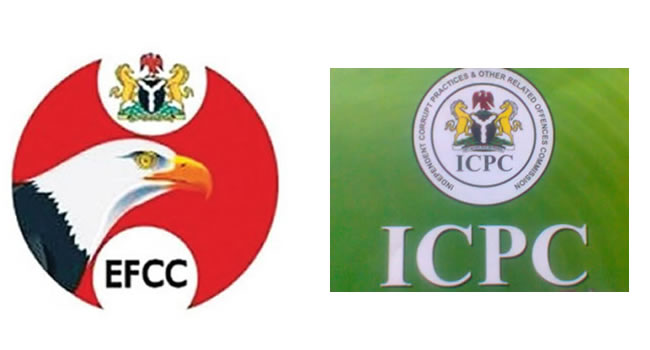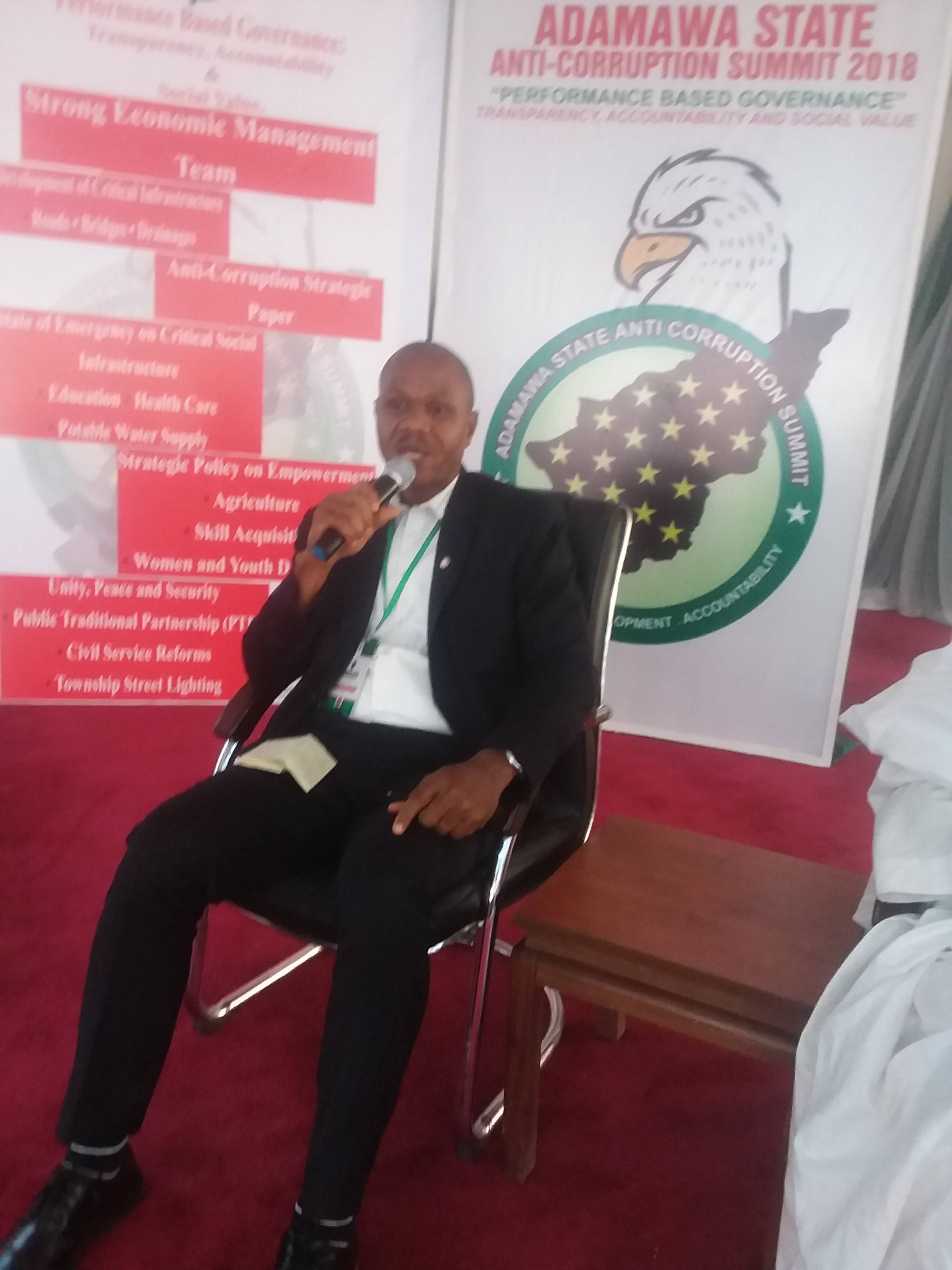• Alleged misuse of nolle prosequi raises concern
• Inability to prosecute suspects in Haliburton, Malabu saga
• DSS sting operation on judges affecting cases in court
• Saraki makes U-Turn, praises Magu for ‘doing the right thing’
Indications emerged last night why the Economic and Financial Crimes Commissions, EFCC, and the Independent Corrupt Practices and Other Related Offences Commission, ICPC, are reluctant to hand over case files of indicted high profile including former governors whom they have concluded investigation to the office of the Attorney General of the Federation for prosecution.
Multiple sources with the EFCC while confiding in the Daily Times newspaper yesterday revealed that the EFCC had concluded the investigation in most of the high profile cases and that trial has already commenced.
One of the source who would not want his name in print due to the sensitive nature of the case said, it will not be proper to handover such cases to the office of the AGF since full blown trial have commenced in most of the cases.
The source also disclosed that the powers of Nolle prosequi had been abused severally by some past Attorney Generals of the Federation who withdrew cases involving their close associates.
The source specifically mentioned a former Attorney General of the Federation and Minister for Justice, Mike Kaase Aondoakaa SAN, whom he accused of shielding a former governor of Delta State, James Ibori from prosecution. The source also alleged that Aondoakaa tried so hard then to frustrate the efforts of the EFCC investigations of Ibori and other high profile cases adding that he was instrumental in the removal of the then Chairman of the commission Nuhu Ribadu from office.
He added that based on such experience, the anti corruption agencies are not too eager to handover their case files to the office of the AGF.
The source further told the Daily Times that the EFCC is also conscious of what happened during the sting operations on judges by the Department of States Security Service, DSS on October 7 and 8, 2016. He said,the sting operation which received the approval of the office of the AGF, had provoked judges.”
The judges are still angry about the raid and the anti graft agencies are conscious that it had created bad blood which is robbing on the successes of the cases before the judges.
“You can see that the case of Justice Adeniyi Ademola, who was accused of corruption and illegal possession of arms yielded no favourable results as he was discharged and acquitted from any wrong doing. “ The National Judicial Council, NJC also recalled him from suspension few weeks after he was discharged and acquitted”.
Stating that there is disquiet sounding the incident of judges arrest, the source added that the cases of some of the arrested judges were yet to be filed in court several months after their arrest.
The source also alluded to the cases of Halliburton and Malabu Oil scandal whose investigation were concluded and the office of the Attorney General developed cold feet in the prosecution of culprits.
The source added that it is illegal for the AGF to take over cases already initiated by prosecution agencies since it has been empowered by Section 174 of the 1999 Constitution (as amended) to initiate and terminate proceedings at any stage.
The Special Adviser to the president on prosecution, Mr. Obono Obla, SAN, had asked that the prosecuting agencies should submit the files of ex- governors to the AGF for prosecution.
He alleged that the prosecuting agencies have refused to co-operate with the office of the AGF. AGF office keeps mum: When contacted, Special Adviser to the AGF on Media and Publicity, Comrade Salihu Othman did not answer his call.
The Daily Times recalls that trial of Jeffrey Tesler, a British lawyer who pleaded guilty for his role in the bribery scandal, and some high-ranking Nigerians has long been concluded by an America court while Nigerians accomplices openly named during the trial are walking the streets free.
The Halliburton bribery scandal, dates back to 1994 when the Nigerian government launched ambitious plans to build the Bonny Island Natural Liquefied Gas Project.
The fraud that accompanied it had revealed a network of secretive banks and offshore tax havens used to funnel $182 million in bribes to Nigerian officials in exchange for $6 billion in engineering and construction work for an international consortium of companies that included a then Halliburton subsidiary.
However, nobody has been arraigned before any Nigerian court after several names were mentioned until recently in the President Muhammadu Buhari-led government that charges were filed against some persons before the Federal High Court.
In a related development, the Senate President Bukola Saraki on Tuesday shared a personal encounter he had with Ibrahim Magu, acting chairman of the EFCC, when former President Goodluck Jonathan was in power. Saraki said he and some of his colleagues at the upper chamber of the national assembly were sent to Magu’s office because they opposed some issues. The senate president, who did not go into details, praised Magu for doing the “right thing”.
He said this when he featured on a NAN forum in Abuja. He said, “As an individual, I have had a personal experience with Magu, where he stood up for what is right. “I remember during the former President Goodluck Jonathan’s administration, where because we were fighting some of the issues then, some of us were sent to the EFCC.
“I remember I was sent to Magu’s office. They were trying to get him to investigate something of 10 years, 12 years ago; I remember Magu said nobody was going to use him.”
But Saraki also disclosed that the screening of Magu was done in the interest of the nation, saying if the senate had an ulterior motive, it would not have aired live on national television “for all Nigerians to watch”. He also blamed Magu’s rejection on a report from the Department of State Services (DSS), “among other issues”.
He then said , “I think there is a lot of misunderstanding and blackmail and all is not in the interest of democracy.
“The rejection of candidates presented to the national assembly is a process. It is a process that is not restricted to the EFCC chairman. “It is a process that has to do with the governor of Central Bank, director-general of Lottery Commission, Electricity Regulatory Commission and other relevant agencies. “We have approved many people from the executive and we have rejected some and when we reject them, it is not for any personal reason, because it is a process. “Magu’s screening was on a Wednesday when we air plenary ‘live’. That is to show you how transparent the senate was on Magu’s confirmation.
“We screened him on a Wednesday so that all Nigerians could watch.” Saraki maintained that the decision of the senate to reject Magu was in the interest of democracy.
He added that the decision was based on a test which he failed, adding that if the senate had disregarded the DSS report and went ahead to confirm Magu, posterity would judge the members. He said,
“This is about an institution; let us say you are screening the governor of Central Bank and EFCC reports that the man lacks integrity and that he is not honest, will you just discard that? “Even if you do, years later you are weakening that institution.
We should stop talking about personalities. We should be focusing on how to strengthen our democracy. “When some people have particular interest, they will try and bring this down to individuals.
There is nothing personal on the personality of the acting chairman of EFCC.” On allegations that Magu’s confirmation was stalled for fear that senators may be prosecuted by him, Saraki said it was far from the truth.
He pointed out that the fear that some of the former governors who had cases to answer may have contributed to the rejection was unfounded. According to him, some of the former governors already had cases before the courts, and Magu, even if he was confirmed, could not have gone to the courts to withdraw the cases.
He described the allegation as cheap blackmail, and said Nigerians had to decide whether or not they wanted to strengthen the national assembly as an institution. Saraki also said that going by democratic practice, there was a need for checks and balances, adding that the parliament had the power to confirm or not to confirm nominees. He said,
“The days I confirm, I don’t commit a crime, but the day I don’t confirm, all hell will break loose. “It is very unfortunate. When people say we don’t want to fight corruption, does fighting corruption start and end with an individual? It doesn’t. We have played our role.
We will leave posterity to judge us. It was aired “live’’. It wasn’t that we did it at night or in a close-door and then announced the result to the public.
“They saw it. You can ask them if it looked as if this gentleman was not given fair hearing or something. Our argument is, today it is Magu, and tomorrow it could be a president. Praising President Muhammadu Buhari for his integrity, Saraki said, “Today we have an honest transparent president, tomorrow we could have a corrupt and dishonest president, who brings his best man to be the governor of Central Bank and together they want to connive and steal money.
“When the name is taken to senate and senate rejects it, the president will say, ‘my friend, continue’. So, it is about systems and processes.
Whether you like Saraki or you don’t like Ekweremadu, it is not about us. By the end of our tenures, we will go. It is about the institution. “We cannot belittle or weaken the institution because it is that institution that separates democracy from dictatorship.
When you weaken the parliament, you have weakened democracy. If you think by so doing you are weakening Saraki, you are not, it is the institution.’’
He said the hatred for the parliament was fuelled by some people with vested interest, while pretending to be fighting for the system. Saraki said the 8th senate would not be distracted by anyone or issue, adding that the chamber had passed at least four anti-corruption bills to support the government.




